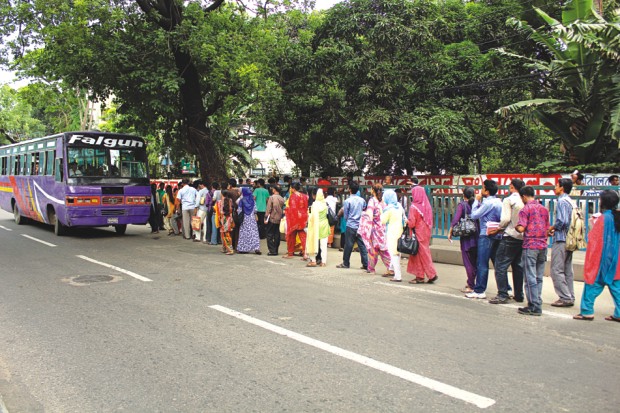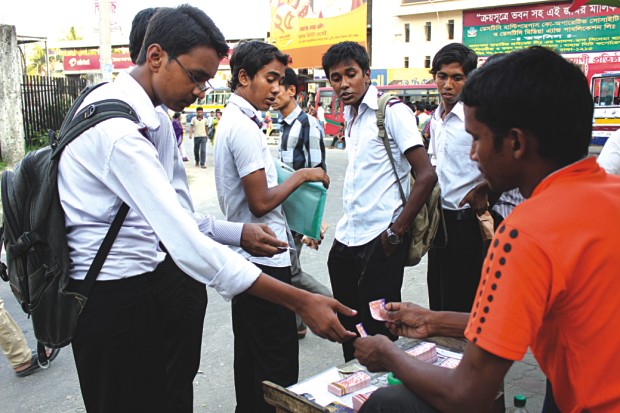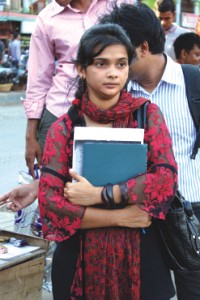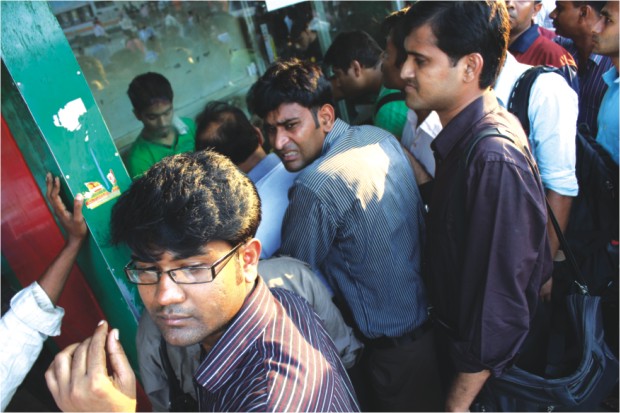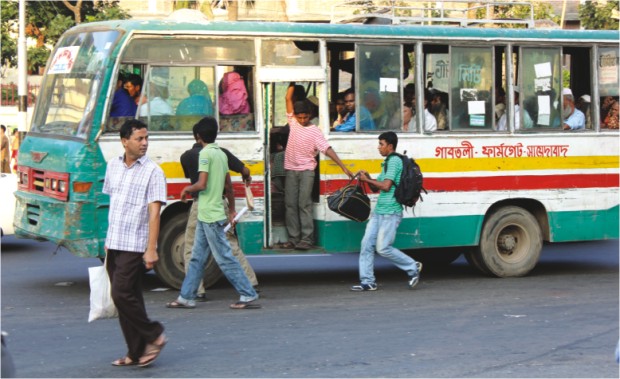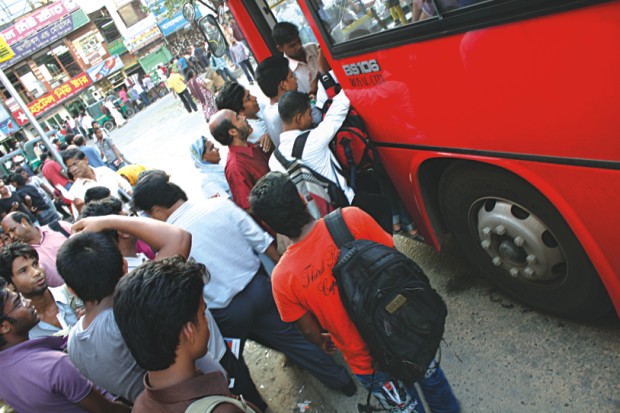| Home - Back Issues - The Team - Contact Us |
 Linking Young Minds Together |
| Volume 3 | Issue 23 | June 12, 2011 | |
|
Spotlight
(Not) Too Fast, Too Expensive Rakibul Hasan Arafat Ahmed, a private university student was sweating profusely standing in a long queue to get into a passenger bus. Arafat lives in Uttara while his university is in Dhanmondi. Every day it takes him almost two hours to reach his university as the privately owned bus services never come on time and campus commuters like Arafat have to spend a major portion of their student-life in the never-ending tailbacks on Dhaka roads. The ticket seller of the privately owned passenger bus company was refusing to give away any tickets, as the man was not sure whether the bus would really be able to make it on time to the bus stand, since the company does not have enough buses to provide punctual and an organised service to its customers.
Once the bus finally arrived, there was a mad rush amongst the passengers to collect tickets. All of a sudden, Arafat got to learn that the bus fares have been doubled since the government has increased the price of Compressed Natural Gas (CNG) and petroleum products. To Arafat, it seemed that the sky had literally fallen on his head! Getting a very limited amount of pocket money from his parents every month along with the increased amount of bus fare, Arafat's money disappeared within a couple of weeks. Like Arafat, almost all students living in Dhaka City, who have to move by bus to reach their schools, colleges or universities, suffer from the newly increased bus fares. Privately owned passenger buses, being the major and sometimes the only public transport in the city, these students have no other options other than commuting on buses, while putting up with the sudden increase in the bus fares. Transport operators in Dhaka, who are always willing to hike up bus and auto-rickshaw fares, have not missed this fresh opportunity to double the fares of passenger buses since the government decision of increasing the price of CNG and petroleum products came into effect from last May. The irony is that, the price hike is seen not only in the privately owned public transports but also in the government run transport service; the Bangladesh Road Transport Corporation (BRTC) has raised the bus fares in government owned BRTC buses. As a result, altercations between the enraged students and transport staff have become a common scene while extra fares are being charged from the students.
According to a Daily Star report, many bus operators continue to charge an illegitimate extra amount for bus fares from passengers despite the warning from the communication ministry; route permits of such bus operators would be cancelled. Though the government has approved a fare chart that consists of the costs for travelling different distances in public transports, the bus owners are showing reluctance to realise the legitimate fares from their passengers. The Bangladesh Road Transport Authority (BRTA) and several teams of Dhaka Metropolitan Police are operating on the streets to penalise the errant bus operators. However, the crack-down on bus operators for overcharging passengers are resulting in a number of buses being taken off the road, where the students, especially, end up suffering the most.
“The bus operators are charging extra and it is absolutely illegal! I would always travel by a private owned bus service which runs between Uttara and Motijheel. Now as they have increased the bus fare, I have to pay Tk 30 (instead of Tk 22) to get to my campus in Kakoli, which is the same price as that for going to Farmgate or even Shahbagh,” says Apu, a BBA student of a private university.
Amidst all the fare increase hassle, the female students now face fresh problems, like a limited number of seats on the passenger buses and reluctance shown by the bus conductors to allow female passengers on the bus during rush hours. “According to the law, every passenger bus should reserve at least nine seats exclusively for women. However, most of the time, I have found male passengers occupying these seats and telling them to leave those seats often result in severe arguments. So I have stopped bothering about sitting at all and prefer to stand,” says Farhana, a college (higher secondary) student, frustrated.
As passengers or in particular the enraged students are often getting into altercations with the staff of the bus companies over the issue of increased bus fares, sometimes these verbal altercations turn into petty clashes as well. “Though it is the company's decision to increase the bus fares and we, the staff and workers, have nothing to do with it, passengers, especially the students of colleges and universities often get quite aggressive. The other day a university student ended up slapping me. This kind of behaviour is not expected from the educated section of the society,” says Farooq, a bus conductor.
So, what could be the solution to resolve this anarchic situation? Students who are suffering from the recent transport dilemma have multiple propositions. Ali, a Dhaka University student has adopted quite a creative way as he is now riding to campus on his bicycle from home in Sutrapur. “Though roads in Dhaka have become quite dangerous, I prefer to cycle to campus as it costs me less and is quite refreshing as well.” Even though cycling can be an option for many students, it is still very difficult for the female students to go for this option because of unnecessary social 'barriers.' However, many women, today, are fighting to break these barriers, so that they can also enjoy the freedom on the streets. In addition to that, given the present conditions on the roads of Dhaka, cycling from one place to another for students is also not always safe.
Many students suggest that the government should issue special monthly or weekly bus passes for students at a cheaper rate, so that they will be able to travel from one place to another without having to worry about paying the extra amount. This is a practice followed in many countries and can be taken into consideration by the government in our country as well. Authorities in many major cities around the world issue students from recognised schools, colleges or universities special transport cards which allow them concessions in fares when travelling by public transport. Commenting on the proposition of monthly passes or special ID cards, Major Quazi Shafique Uddin, Deputy General Manager of Bangladesh Road Transport Corporation (BRTC) says, “We are always willing to stand beside the students. Special BRTC buses for the school children have already hit the roads. However, presently we do not have any plans to provide the students with special passes or IDs. But if the concerned government ministries like the communication or the education ministry come up to us with such proposals, we would obviously consider the issue with priority.” The city of Dhaka is home to thousands of students and more, who have to travel across the city regularly. The student community of Dhaka face acute travelling problems owing to illegitimate hikes in bus fares by the transport owners and also because of lack of proper transport facility. Since the problem of inadequate transport facility is becoming unbearable for the students every day, it is high time that the concerned authorities, in both the government and private sectors, come up with definite strategies for an effective transport infrastructure to cater to the present and future needs of students. Copyright (R) thedailystar.net 2011 |
||||||
